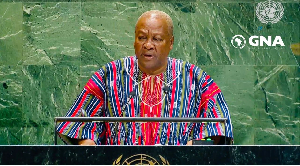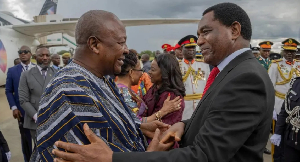Accra, Aug. 2, GNA - Contributors at a roundtable on Wednesday agreed that the privatisation of Tema Oil Refinery (TOR) should be subjected to a thorough public debate to avoid the transfer of the facility to a monopolistic investor. They also agreed that it was risky to leave TOR, a strategic facility, in the hands of a foreign investor.
The contributors were brainstorming on: "Protecting the Poor, and Seeking the National Interest in Public Policy Decision-Making" organized by Integrated Social Development Centre (ISODEC). Dr Esther Offei- Aboagye, Director of Institute of Local Government Studies led the discussions. The contributors said the debate on the issue should take into account ownership, management, capital and technology as factors that could make a facility public or private so that many could benefit from its operation.
Dr Nii Moi Thompson, an Economist, handling the topic: "The Social and Economic Imperatives of Petroleum Price Subsidy and Cost/Benefit Implications of Its Withdrawal" said the management of the country should move away from "colonial punitive mentality" where the price of gas could be increased because it was being used by commercial drivers unmindful of the fact that the poor also used the LPG gas for domestic purposes. He said if people were using the commodity then there was the need to produce more and not to penalize them by raising prices.
Dr Moi Thompson said since government was the largest vehicle owner it was necessary to improve public transportation system, which should not be synonymous with poverty. "People try mightily to avoid it because no one wants to be viewed as poor and that government should have a presidential luxurious bus to cut down fleet of cars that follow the President on a tour."
Dr Moi Thompson said Ghana could learn from the developed nations, adding: "In better managed societies, public transport is for the rich and poor alike. In New York City, the Mayor takes the train to work. Indeed in downtown Manhattan, where Wall Street is, some of the wealthiest people in America ride the trains to and from work. They only drive on weekends."
Mr Ato Ahwoi, Energy Policy Advocate and Political Activist, speaking on: "TOR as a Strategic National Asset, and its Role in National Economic Development. Emphasis on its Viability and Potential for Generating Foreign Exchange for the Country", said any foreign investor interested in processing crude oil in Ghana should establish his own refinery. He should be encouraged to import his own crude oil, process and market it.
Mr Ahwoi said any investor in the petroleum industry would eventually had to lodge its proceeds with the Bank of Ghana for the purposes of purchasing foreign currency to meet the cost of the crude oil import. He said deregulation should be tackled with caution, saying: "As a country, we have had some experience in deregulation of some sub-sectors of the economy. Since 1987 the foreign exchange sub-sector has been deregulated. The result has been that the cedi has so depreciated against the dollar that from 180 cedis to a dollar in 1987 the exchange rate is 9,500 cedis to a dollar in 2006, an increase of over 9,300 cedis to the dollar over a 20 year period."
Mr Ahwoi said Ghanaians should expect that when deregulation of the petroleum sub-sector was undertaken, the result would be no different from what had happened in the foreign exchange sub-sector. "Total deregulation of the petroleum sub-sector must, therefore, be undertaken with a lot of circumspection and caution."
Dr Kwame Ampofo, MP for South Dayi, speaking on: "Poverty, Social, Impact Assessment (PSIA)" said deregulation could either be in the interest of the poor or rich in that "deregulation is not synonymous with prices going up or coming down". He said pricing of petroleum products policy should be done on the non-partisan manner so that the State could share in the responsibility so that releasing funds from a sector to a sub-sector to subsidise would not impose undue hardship on another sector of the economy.
Mrs Roseline Obeng-Ofori, Gender Consultant, speaking on: "Gender Implication of Raising Petroleum Prices," said it was women and the vulnerable that would always be hard hit during any price increases. She said many women fell out of business because their prices were no longer competitive due to high transportation cost. Dr Steve Manteaw, Co-ordinator ISODEC, said a public forum would be held on the petroleum sub-sector to ensure that many people contributed to the debate on the Government's current petroleum sector policy.
Business News of Wednesday, 2 August 2006
Source: GNA












